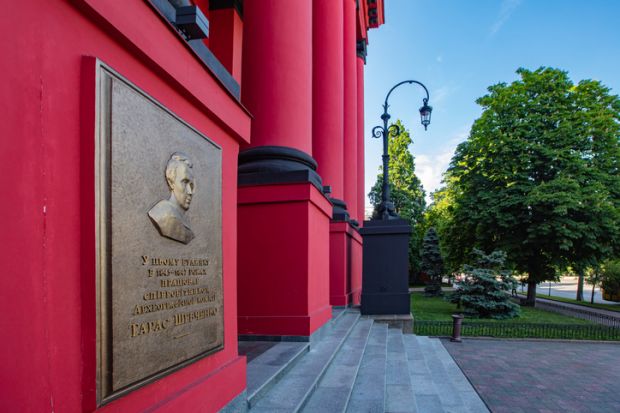Russian missile strikes have hit Ukraine’s “flagship” university in what academics described as a deliberate offensive against the country’s intellectual heritage.
On 10 October, Russian rockets hit multiple civilian targets in western Ukraine, including one of the nation’s most prestigious institutions, the Taras Shevchenko National University of Kyiv (KNU).
“How symbolic,” wrote Anton Geraschenko, adviser to Ukraine’s minister of internal affairs, noting the irony of the strike, which damaged rooms in the university’s department of Russian philology.
But even as Ukrainian commenters have made light of the situation, calling it “friendly fire”, it has become clear that the war’s rising costs for higher education are no joke.
According to Ukraine’s Ministry of Education and Science, 2,608 education institutions have been hit by Russian bombs and shells, and 313 have been “destroyed completely”. Many of these are schools, although universities have also taken a beating, with eastern institutions such as the Kharkiv National University sustaining heavy damage.
While less destructive to physical infrastructure, the recent strike on KNU is notable for its symbolism, academics said.
“It has no military value, but it is a symbolic intellectual threat to Moscow as a hub for growing the Ukrainian elites,” wrote Viktor Kovalenko, an alumnus of the school and formerly an adjunct lecturer in its journalism faculty, on Twitter.
Speaking with Times Higher Education, he said the attempts to “inflict greater emotional harm on Ukrainians by destroying their significant cultural and educational institutions” were a sign that Russia’s military was “running out of means to continue the war”.
Dmytro Chumachenko, an associate professor at Kharkiv’s National Aerospace University, agreed.
“Russia is trying to sow terror by destroying civilian infrastructure and universities. After all, education is the foundation of a democratic society,” he said.
The choice of target was telling, academics said.
“It’s the flagship of Ukrainian higher education,” said Anatoly Oleksiyenko, a scholar of post-Soviet studies in higher education policies based at the Education University of Hong Kong.
The institution is named after Taras Shevchenko, Ukraine’s national poet – a figure “on a par” with Robert Burns in Scotland, or Adam Mickiewicz in Poland – who “embodies the Ukrainian spirit and quest for freedom, which Russians have been trying to extinguish for decades and centuries”, said Professor Oleksiyenko.
Since its establishment as the Imperial University of Saint Volodymyr in the 19th century under the Russian empire, the institution has played a “significant role in shaping the Ukrainian idea of nation, statehood and culture despite the tsarist repression”, he said.
After Ukraine declared independence from the Soviet Union in 1991, the university was among the country’s main institutions leading efforts to decolonise and then nationalise Ukraine’s higher education curriculum – especially in the social sciences and humanities, disciplines the Soviets had used to “indoctrinate Ukrainians, eradicating national consciousness and references to independence or resistance movements”, Professor Oleksiyenko said.
Beyond its role in teaching and research, he continued, the university is known as a “prominent space for intellectual exchange”, hosting international conferences with Ukrainian academics and politicians.
The onslaught of missile strikes on 10 October has also had a more-than-symbolic impact on daily life and education, with thousands of people lacking electricity and teachers and students being forced to continue classes in bomb shelters.
But academics expressed confidence that Ukrainians would fight back with fresh ferocity.
“After descending into the basements, even elementary school students continued to sing the anthem of Ukraine,” said Dr Chumachenko.
“The Kremlin will not be able to achieve its goal of intimidating the population.”
Register to continue
Why register?
- Registration is free and only takes a moment
- Once registered, you can read 3 articles a month
- Sign up for our newsletter
Subscribe
Or subscribe for unlimited access to:
- Unlimited access to news, views, insights & reviews
- Digital editions
- Digital access to THE’s university and college rankings analysis
Already registered or a current subscriber? Login








